Robert Bohm
THE PRECIPICE POEMS
India, January 2002
Introductory Note
I wrote The Precipice Poems not quite a year ago. The sequence was written during the weeks leading up to my daughter's wedding and immediately following the wedding. As such, the sequence is a record of images, emotions and events pertaining to the marriage.
However, since nothing exists in isolation, the marriage and related activities didn't form a discreet process independent of other things happening at the time. On the contrary, they were part of a historical moment teeming with realities (post-September 11 terrorism concerns, the beginning of the war in Afghanistan, the continuing conflict on the Pakistan-Kashmiri border, etc. ) that, because half our family lives in the U.S. and the other half in India, possessed a special significance for us. After all, in India, as in so many other places in the world, although there was sympathy for the U.S.'s losses during the Sept. 11 attacks, there was also a feeling that the U.S. government often doesn't take the time to understand other cultures. As a result, the war with Afghanistan was viewed by many Indians as at best a misguided effort.
Another aspect of the special significance I just mentioned was this: the wedding forced those of us involved in it to face the necessity of fully comprehending the marital concept of "bringing together" two disparate souls and making them one, since in this case one of the souls was an agnostic and the other a Muslim -- a Muslim at a time when, both in the west and among extremist Hindus on the subcontinent, Muslims are often stereotyped as violence-prone and philosophically underdeveloped.
Prior to writing the following poems, I didn't commit myself to including, or making sure I was guided by, any of the issues I've just mentioned. However, anyone who writes brings who they are to what they write, and so it certainly didn't surprise me when what began as a single poem turned into a sequence of poems that strove for a density of meanings and sensualities that incarnated the way life -- in its nakedness, and unmediated by shallow artistic notions of what we should and shouldn't write about -- teems.
One of the sequence's poems includes the following words about a political assassination in Delhi that occurred while the sequence was being written:
Beyond the sentimental, a morning street. Proclaiming
the existence of the real, bullets fly from under
the motorcycle rider's shawl.
These lines, as in many other places in the poems, are like a wormhole in space through which one part of reality is connected to another. Either depression or creativity or some combination of the two leads me to believe that if the real can't be located in our poems, there's no sense writing poems.
In another poem from the sequence are these lines:
. . . What year it is
no longer matters. "The night
flies into the trees, daddy," five-year-old Leela
laughs, using a Marathi phrase in a then
that's also now, as, in late afternoon on a cliff,
the priest observes how she, grown, a bride, observes
the ceremonial fire.
In his Letters to a Young Poet, Rilke wrote, "Seek the depth of things." That depth includes the vast network of simultaneities that exists within each moment: this noise, that noise, this other noise, this event, that event, etc. But each moment also includes the depths added to it through memories: all those thens that exist in all these nows. Of course, the past and present, when merged, sometimes seem like disorientation. Such bewilderment is clarity's first stage.
When we live in the depths of things, we learn what it means to live. When we don't live there, we learn nothing.
Of course poets always talk about wanting to be deep. But the truth is that in America much of this talk is a substitute for actually doing what the talk talks about. We invent aesthetic rules precisely so we can justify not writing about certain things -- politics is an example of a mostly taboo subject matter in U.S. poetry, unless, that is, we choose to write vacuous poems that include predictable pieties about subjects like the national sadness stemming from
Sept. 11; such pablum is allowable, whereas any poetry of vision that attempts to probe more deeply into the political nature of events is deemed unpoetic or worse.
To quote Rilke again from Letters: "Only someone who is ready for everything, who excludes nothing, even the most enigmatical, will live in relation to another as if that other is alive and therefore will himself draw exhaustively from his own existence."
In spite of a certain amount of worry and fear having to do with world events, The Precipice Poems were written with great love for, and with a desire to honor, two groups of people:
(1) all those who helped make Adriana Leela and Shane Umar who they are, and
(2) Adriana Leela and Shane Umar themselves.
- Robert Bohm
Listening to Music in Mumbai During the War
for Savita and Poornima
1
As it takes off, the egret's feet skim
across water, sound's disappearance.
The santoor player looks around.
2
In the slum's reeds, a breeze whispers.
In one of the marsh huts constructed
of cardboard and plastic:
the brush's murmur as a mother pulls it
through her small son's hair.
Hours pass. At the rice paddy's edge,
a bird sits in morning light on the water buffalo's back.
Its beak makes a faint snapping noise
as it eats insects off the buffalo's skin, thicker
than the tabla's membrane from which
the thunder's rhythm comes.
Beyond here,
a Kabul only these notes can reach.
Possibly.
A plane swoops low, melody in search
of something else's
or its own
tremolant tone.
At note's end: silence's valley. In it
Kashmiri gunmen
disappear into fog.
3
Ustad Rashid Kahn's voice:
The sound of the rice shoot's green
grows heavier than boulders behind the ancient Hampi temple. An egret feather
floats on a pond.
The bus fumes' quiet dominates
Kirloskar Rd.
near where, once on a balcony, someone
crawled in the rain.
One note, an earthquake.
Gujarat's ground cracks open.
Love's howling begins.
The mind drains
into a ravine.
4
Here, where the music is, night
improvises a moon.
A woman in burkha treads past rubble.
Love sobs in the trees.
Rashid sings.
In the fields
the egret, nowhere
to be found.
|
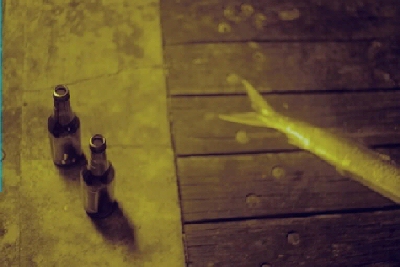
"Fish & Bottles" by marina buckler
|
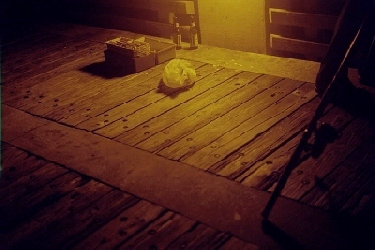
"Still Life" by marina buckler
|
Sick at Pune Train Station
A harmonium player who isn't there
shivers into existence as the fever rises.
Draping a second blanket over my shoulders,
my son disappears.
At night, an afternoon of bird notes;
no train comes. I propose
to Begum Akhtar who sings ghazals
just for me.
Once, a road's bauxite-reddened dust
blew in the air as lorries roared by.
Around each bend, the wished-for whispered, "More! More!"
Where is the Kokcha river, nothing's muddy mirror?
Hassan's uncle mocks hopelessness while chasing a long-gone goat
through the village in which we once lived.
Under her burkha Mumtaz writes poems
with an eyelash on dark cloth.
"What does such poetry mean?" a newsman screamed
on the TV yesterday.
The harmonium player on the platform
tugs at my shawl on the red road.
My son, carrying me in his arms, orders
"Daddy, show them what the living know!"
Yes that's a good idea I think waking up
in a different train station. Belgaum.
Anand, balancing the sky on his back, walks
toward me shouting,
"You are here!"
My son lugs baggage
from the train.
Crows shriek morning
into being.
|
Vengurla Late Afternoon
Each wave washes
over sand, under skin. Foam
bubbles break. Language
unborn.
Eyes closed, I cut off
my ponytail, throw it
into the wind, listen
for the sound of each hair strand
fall.
One after another
waves roll in.
The sun sets, although
I don't know when.
|
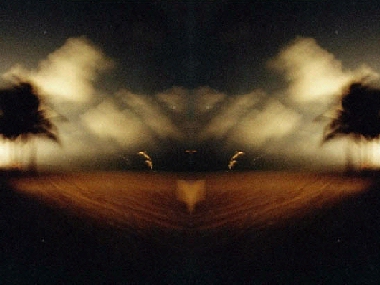
"Beach" by marina buckler
|
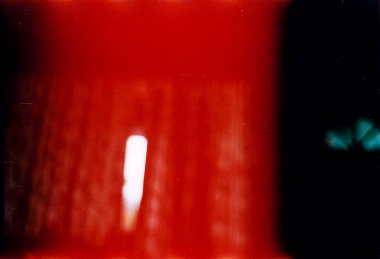
"The Red Curtain, The Blue Window" by marina buckler
|
Clarity's Birth
On the breakfast table,
jasmine in a bowl.
The mind rests, a baby goat
on the hill near Ganeshpur.
Anand scrapes seeds from the sliced papaya
with a spoon.
Bougainvillea overgrows barbed wire.
A bird sings there or in the fruit.
|
Ft. Aguada
1/12/2002
I give her away but don't.
Who can give
the unowned?
"Is that a blue sari?" "No."
From the cliff, look. The sun sets
on the sea.
"What a sea!"
"Farouk sailed to Oman once."
Below on the beach,
thought, a sand crab, races
into a hole. Where
the shenai player
is, his notes
are too.
Look. Bride
and bridegroom clutch
each other -- on a precipice
high above the sea.
|
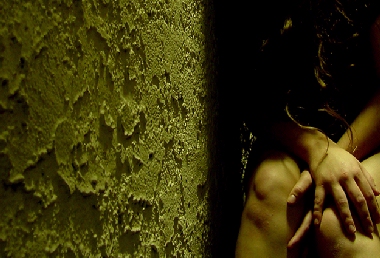
"Ram" by marina buckler
|
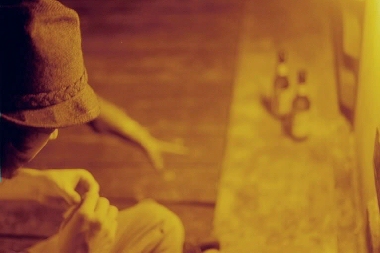
"We Do Not See the Eyes" by marina buckler
|
Ft. Aguada's Ghost at Night
The battlement's stones, entrenched emotions
pounded by waves. Standing
on a wall no piano knows about, eyebrows thicker
than the sea he contemplates, he remembers
jasmine and what it means
to leave home as the midwife, crouched
in morning mist, grinds flour
near a hillside paddy from which
a white crane ascends, light
returning to itself. A Maratha warrior
trained to listen, he hears the sound
plankton makes as it drifts near rocks
where soon the barnacle
will grab it. But something more
is there, the cold spray and a ship's masts
creaking in the wind. Over the years
foreigners come and go. Only he
remains, the one
who guards silence in the spaces between
sand grains on the beach.
|
Talking About Ghazals With Gune
Silence rhymes with itself. A breeze sifts through
the water buffalo's beard. The sea is almost blue.
A thought passed from one human to the next:
silence's harmonium creates a note just for you.
Waves pound the beach;
love tells the coast, "I'm here too."
|
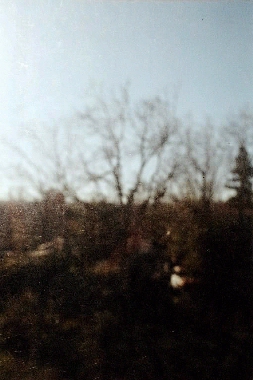
"Caltrain" by marina buckler
|
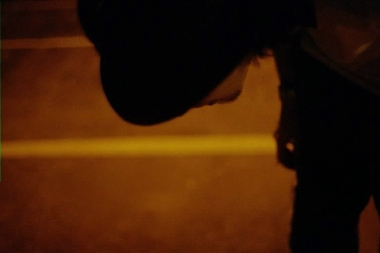
"He Bends or Is Bent" by marina buckler
|
Fragments of a Letter from the East
"I wonder what we, safely back here, look like . . . to them"
- J.P.
1
Not kittens playing with a dead woman's hair
on a lawn that stretches,
a mind without limits.
Not, years ago, escapees huddled
in Black Forest snow, or was it east of the Ob
in Siberia?
Not, no not, no . . .
If he is safe, an aging man and his memories
mean nothing to those who suffer now.
2
Beyond the sentimental, a morning street. Proclaiming
the existence of the real, bullets fly from under
the motorcycle rider's shawl.
Near where the milk wallah walks,
dead police lie on Chowringhee Rd.
Like nuances eluding the mind's grasp,
the assailants disappear.
Further north, the muezzin's call to prayer: a river
winding through Kashmir, fracturing valleys
and creating gorges where none were before.
3
"Did someone say something?"
No.
It was a tree frog's footfall in the Goan jungle
near the Safa masjid at Ponda's outskirts
long after dawn.
Under a cassia, one man hands another money.
It's arranged: after the wedding, the village will hold a party.
The mullah, recently sick, is thinner than he should be.
Unlike the killing, this happened weeks ago.
4
Something nameless makes an unheard noise miles away.
Oblivious, the gunman in the mountain trench
lifts his grizzled face, his eyes
a country where the infirmaries are in flame, toward me.
"Why?" I ask, frightened
of the viburnum all around.
Later on a Srinagar street
a man, his hair burning, dances with
a voluptuous whore of smoke.
Entranced by her, he doesn't
look at you.
|
In More
The still-smoldering bus tires' stench, inhaled
by the yellow cassia flower, percolates
deeper into things than the politicians
think. Nearby, the water buffalos' field
welcomes the egret. Like the perfect merger of me and that:
a melted comb intertwines forever with
the imam's daughter's hair. Mansur glares upward
through a ceiling hole into a light that isn't there. Here
where the road bends, an inclination
curling toward what can't be seen yet, the teak tree
shades the boulder upon which
the monkey sits not far from where
someone in a hovel sings a lover's song:
"A huge moon hung, a good omen, in the sky and so . . ." What
dreams we have, what hopeful diasporas beyond the cutting
of the sugar cane. The grainsack carrier who, bent over,
plods forever in the marketplace, eying dirt the way
some people eye the sky, knows how to boil lentils
to make perfect dal. Not far from where
he lives, a bus full of burning Muslims leaves the station
every night, tires
spinning, fields stretching everywhere
in more directions than there are.
|
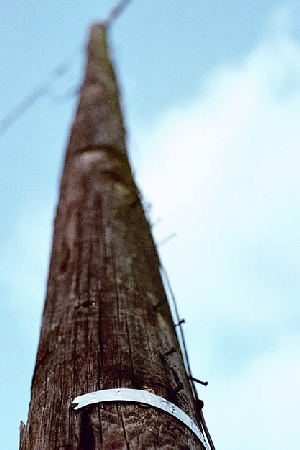
"Pole" by marina buckler
|
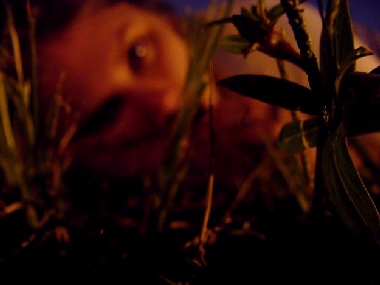
"In the Grass" by marina buckler
|
To Lynn, from above the Vale, Kashmir
Snow on mountain peaks; a lake blacker
than the dead boatman's eyelashes. Blood trickles
from a knuckle as a woman grubs for edibles
where there aren't any. The wind, a reminder,
howls, trapped
by the gorge's walls. When the sound
of guns stops and no explosions shake
Srinagar miles behind her, the silence
amazes, even more than, far away,
the boulders' muteness high above
Little Burro Creek. That is where you walked
yesterday without me in an Arizona
of useless disappearances, your silence there
drowned out by the chinar tree's here
in the dusk that follows
a daylight you don't know about. She
stands up, departs. I
do too. The mountains'
shadows grow longer, hope
stretched as far as it
can go.
|
Eyes Closed
Sound's flotsam spills onto the beach;
feet sink into sand.
The almost-silence washes back
into the sea
(goodbye, parrot and jackfruit tree)
then returns.
Hello everything.
Breathe in, breathe out,
pull the sea to here, send it away to there,
in, out.
Ebb and flow.
In a week I leave again for Srinagar.
I will carry the sea in the suitcase
of my heart.
Eyes closed, moonrise still happens.
Sound's flotsam spills onto the beach.
Leela, listen, Umar, listen
to the sound water makes, evaporating from rocks.
We disperse yet stay together, being
as we are
what we are, as well as the distance in between us.
|
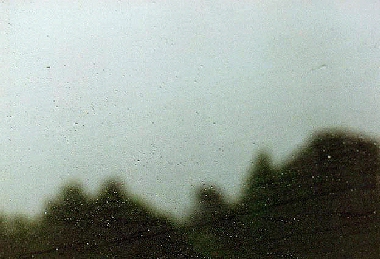
"Blown" by marina buckler
|
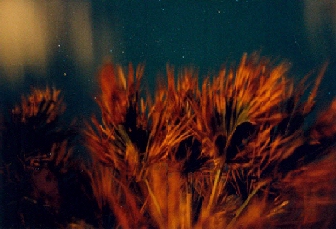
"These Are Not Clouds" by marina buckler
|
Footpath
Shaken in a brass canister, the body's ashes
make a noise: the wind brushing across
the egret's white breast feathers in a field
east of the pump factory. Devki, Ai's servant, weeps,
then rides away into the night on her lover's bike. Behind her
in a daylight that won't die
a water buffalo stands knee-deep in the Hindalga pond
up the hill. When someone burns the bus
with Muslims in it, Devki watches bats hanging upside down
in a banyan north of where her mind
usually goes. Holding my young daughter's
hand, I walk back to the house. What year it is
no longer matters. "The night
flies into the trees, daddy," five-year-old Leela
laughs, using a Marathi phrase in a then
that's also now, as, in late afternoon on a cliff,
the priest observes how she, grown, a bride, observes
the ceremonial fire. "Yes," she intones, marrying
complexity's evolutions . Ai, her grandmother, crouches
on a hill, rifle on her lap, studying
dusk's purple ganerie flowers
sixty years ago. The sea, the old woman's shadow
breaks on the rocks below. In the last year, Ulfat
dead in Srinagar and, another year, Mansur killed on a bus, and still
the shenai players' notes rise, at least
for this one moment, above the family's grief.
My new son embraces me. Sunfire turns sea to steam. In
1988 the tea kettle whistles in a cramped kitchen
in which the old woman, seated on the floor,
drinks tea. Through the window, a papaya tree. Further off,
her daughter, Suman, trudges through monsoon rains, rallying
angry workers. At last the daughter arrives, in another age's dry season,
at her own daughter's wedding, crying because
the dead showed us the way. Here the cliff and here the sea
and here, after sunset, a tentative beginning:
a footpath among rocks, jasmine's dim glow.
|
Current | Previous
Submit | Editors
Join | Donate
Links | Contact
Sundress Publications
|